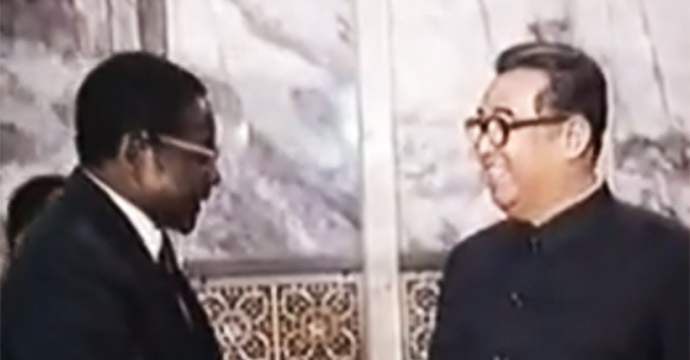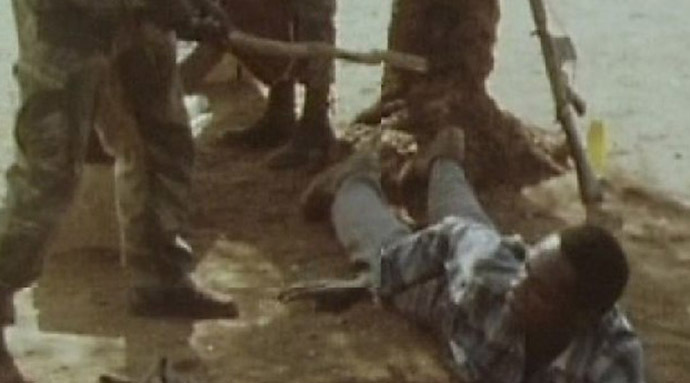via Zimbabwe and North Korea: Uranium, elephants, and a massacre | NK News – North Korea News BY BENJAMIN R. YOUNG , OCTOBER 30, 2013
Admiration for Kim Il Sung led to Gukurahundi atrocity and deep-seated hate for North Korea

Zimbabwe, under the rule of despot Robert Mugabe, has long been a friend of the Kim family and recently aided the North Korean nuclear weapons program. After four years of deliberations, an “arms for uranium” pact was signed between the two in 2013. In exchange for arms and ammunition of unspecified quantities, the North Koreans were granted access to Zimbabwe’s Kanyemba district, one of the world’s largest uranium reserves, for the elusive yellowcake used in making nuclear weapons. News of this deal went unknown in the West but Nehanda Radio in Zimbabwe reported on the pact.
“North Korea has always been ally of this country since the liberation struggle days against white minority rule,” Mugabe said of the agreement, “They have trained our soldiers, and now the press acts as if it’s a discovery that this deal exists. Chinorwadza ipapo chii? Inga nyika dzose dzinotengeresana zvombowani? (What is paining about the issue? Is it not a fact that all nations buy weapons from one another?)”
A BLOODY ALLIANCE
Military-related agreements between Mugabe and the Kim family have existed since 1980, just after Mugabe overthrew white rule. Of all foreign powers, why did Mugabe develop a relationship with the reclusive North Koreans? Much of it has to do with his trip to North Korea that year and his efforts since then to emulate the state and the personality cult of North Korean leaders. Mugabe “came back almost a different man,” according to a former member of his government. “He was tremendously impressed by the stadiums full of people doing mass calisthenics and color displays spelling out Kim’s name or even depicting his face. He came back wanting to change the constitution so that he could become president, like Kim.” After returning from the DPRK, he modeled his birthday celebrations and mass rallies after those he saw in North Korea.
Mugabe also lauded North Korea’s Juche ideology. The government owned newspaper,The Herald, published articles praising the successes of Juche and North Korea. It was even reported in 2007 that members of Mugabe’s government began reading the book, Juche!: The Speeches and Writings of Kim Il Sung, to better understand North Korea’s eternal president and subsequently their own leader.
In October 1980 Mugabe signed an agreement with the North Korean leadership that stipulated that 106 North Korean military advisors would train and equip 3,500 soldiers loyal to Mugabe’s political party, the Zimbabwe African National Union (ZANU). Mugabe was supposedly having trouble with internal “malcontents.” In August 1981, the advisors arrived in Harare, Zimbabwe’s capital, and though the North Koreans were reputed for their toughness, they became infamous for their lavish lifestyles and lack of personal discipline. Subsequently, the first group of North Koreans was phased out in 1982. The second group, under the command of Major General Sin Hyon Dok, trained the notorious Fifth Brigade that would carry out the brutal Gukurahundi campaign. The Fifth Brigade answered to only Mugabe and consequently saw themselves as above the law.
The Fifth Brigade went on to kill 20,000 civilians in Matabeleland, the southern region of Zimbabwe populated by the ethnic Ndebele minority, which supported Mugabe’s main opposition, Joshua Nkomo, and the Zimbabwe African People’s Union (ZAPU). Gukurahundi, in Shona (one of the 16 official languages of Zimbabwe), means “the early rain which washes away the chaff before the spring rains.” During the campaign, numerous human rights atrocities were committed – the vast majority of those killed dug their own graves and were then shot in public executions. Despite Mugabe’s best attempts to cover up the atrocities, the Matabeleland Massacre left an indelible mark on the psyche of its residents. As a result, perhaps no other people in the world detest North Korea as much as the Ndebele.
Mugabe has never acknowledged the atrocities of the Matabeleland Massacre. Instead, he argues that the Gukurahundi campaign was necessary for preserving national unity. However, the people of Matabeleland still remember the tragedies of Gukurahundi and North Korea’s role in training the Fifth Brigade.

Matabeleland Massacre, Zimbabwe
RUBBING IT IN
Mugabe’s government poured salt in the wound when they invited the North Korean national soccer team to train in Matabeleland prior to the 2010 World Cup. Upon hearing this news, the spokesperson for ZAPU, Methuseli Moyo, announced: “Our position is that North Korea is not welcome in Zimbabwe. We are wondering why the people in the Government of National Unity are being (so) insensitive as to bring the same people who caused bloodshed and deaths to our region. They are just looking at the monetary values of this visit, but the fact of the matter is that it will reopen old wounds. There is nothing special about the North Koreans except that they are warmongers and nuclear power specialists.” Due to potential protests in Matabeleland, Mugabe’s government canceled the hosting of the North Korean national soccer team.
Deliberately or not, Mugabe reminded the Ndebele of North Korea’s role in Gukurahundi once again when they hired North Koreans to build a statue of Joshua Nkomo in 2010. The statue, constructed by North Korean sculptors from the Mansudae Art Studio, has oddly North Korean features, with the body resembling Kim Il Sung. Due to the public backlash, Mugabe’s government removed the statue in 2010. However in 2011, in a show of force from Mugabe, the statue was re-erected and placed at the airport in Bulawayo, the largest city in Matabeleland.
So what has North Korea received in exchange for their military training and statue-building in Zimbabwe? Besides much-needed foreign currency, the North Koreans have obtained wild animals from Zimbabwe. In the 1980s, Mugabe sent two rhinos to Pyongyang., which died shortly after arriving in the North. In 2010, there were reports that two baby elephants were going to be shipped to North Korea. Members of Mugabe’s own government criticized the exporting of wild animals and pressured the Zimbabwe Conservation Task Force to expose it to the world – the head of the task force, Johnny Rodrigues, said: “They haven’t even had a professional scientist from North Korea come to Zimbabwe to make sure that these animals can live in their habitat.” Due to pressure from international conservationists, Mugabe canceled the shipment of giraffes, exotic birds, hyenas, zebras, monkeys, and the two 18-month old elephants to North Korea.
THE DEATH OF THE DEAR LEADER
The Mugabe government’s adulation of the Kim family was on display in December 2011 when Kim Jong Il died. While most of the world hoped for a better future under Kim Jong Un, Mugabe’s party expressed extreme sadness that they had lost one of their allies (it is speculated that Kim Jong Il personally approved North Korea’s training of the Fifth Brigade). Didymus Mutasa, the secretary of administration for Mugabe’s ZANU-PF party, told Zimbabwe state radio that Kim Jong Il “was our great friend and we are not ashamed of being associated with him.”
No such adolation came from the ZAPU, who still live with the memory of a massacre 30 years ago. “We will not shed any crocodile tears for the trainer of Gukurahundi, the only problem about his death is that it was before he could account for his actions, we are not apologetic about that,” party spokesman Methuseli Moyo said.
COMMENTS
Sleep with jackals, arise with fleas!